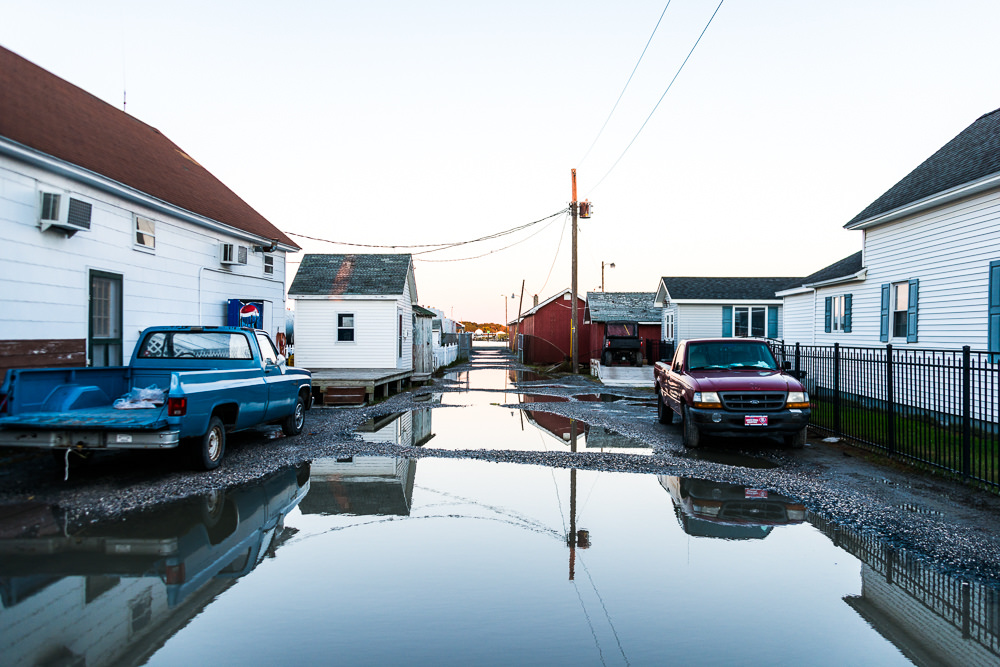Congressman Scott Taylor (VA-2) met with his constituents at an informal “town hall” meeting in Cape Charles on Virginia’s Eastern Shore this week to answer a variety of questions ranging from the national debt, Social Security, mental health, national reciprocity for gun laws, veterans benefits, and many more local and national issues. As one of the most pressing issues, the first term incumbent Republican spoke at length about the sea level rise affecting Tangier Island and threatening its 722 inhabitants.
Sitting just three feet above sea level, the Accomack County island has lost over two-thirds of its landmass since 1850. Many residents believe the erosion is to be blamed for the increasing severity of flooding.
In 2015, a study conducted by the scientific journal Nature claimed that Tangier Island has only 25 to 50 years of habitability remaining. The main reasons behind the subsidence in the southern Chesapeake Bay region is a sea level rise from the melting of the Laurentide Ice Sheet that covered most of Canada and the northern United States over two million years ago. As well, the consequences of groundwater extraction on mainland Virginia, and the remaining effects of a meteor impact near Cape Charles, Virginia 35.5 million years ago are cited as reasons why erosion is set to sink Tangier Island before the end of the 21st century.
Nevertheless, many say it is likely that the encroaching waters from the erosion is influenced and impacted by climate change from increased levels of greenhouse gases in the Earth’s atmosphere and increased carbon dioxide levels in the world’s oceans.
The Eastern Shore has been a part of Taylor’s life nearly since his birth. So, Tangier Island is something that is close to the heart.
“I grew up on the Shore, just on the Maryland side…You can bet that I’m not going to forget the Shore,” he said according to the Delmarva Daily Times.
He explained that he agrees that climate change, recurrent flooding, and sea level rise are issues that need attention, especially with the threatened chain of islands just off the coast.
“On the Shore we can see that, we can see it eroding, whether you’re on the barrier islands or on Tangier Island, as well as Virginia Beach, as well as Norfolk. So it is absolutely an issue that I acknowledge needs work,” he said.
Taylor said he and people affiliated with his office have been working with Tangier Island officials about their erosion problem since he took office in 2016.
“We’re constantly with the (U.S. Army) Corps; I talk to the Colonel all the time, and we’re pushing, pushing, pushing to make sure that we get something moving and expedited,” he stated.
Though, he said there is one issue with coming up with the solutions for erosion in a quicker manner. He explained that since Congress eliminated earmarks, the funds that are spent on a specific projects, not a whole lot can be done without mounting a full legislative offensive.
“What Congress should have done is put things in place to stop corruption, to shine a light on that…but when you take away earmarks, I can’t fight to get directed spending by the Corps of Engineers to help the Shore in some areas, to help Tangier in some areas, because it’s an earmark,” Taylor explained.
“Earmarks should come back. There should be transparency and light to make sure there is no corruption,” he said.
For him, “the reality is, we have sea-level rise,” which is not just an increasingly aggressive problem in coastal Virginia, but around the country. In that case, Taylor believes, the U.S. needs to come up with a comprehensive solution and, “come up [with] ways as a country to deal with resilience.”
In bringing the education sector to the problem-solving table, Taylor, together with Representatives Bobby Scott (VA-3) and Rob Wittman (VA-1), introduced legislation in the House in December that will designate public colleges and universities to provide research, data, and recommendations on coastal flooding as National Centers of Excellence in Coast Flood Research and Education.
“It brings research dollars; it brings economic clusters of potential businesses that help with resiliency. We could do it in this area and we could export those services to coastal areas around the country, and potentially the world,” Taylor said, pointing towards a future of solutions with the U.S. leading the charge to deal with climate change mitigation and for the effects, thereof.
The next steps towards a solution for Tangier Island and coastal erosion and flooding along the U.S. coastline is determining how Taylor, on the federal side, and elected officials who represent the Eastern Shore in the General Assembly, can best help localities work on those top regional priorities.
“We have established what the priorities are; we’re now figuring out where the money flows are and what’s the best thing that we can tackle together at the federal and state (level),” Taylor said. “It’s an ongoing process,” he added.
“You are going to see proposals and potential bills…That’s one of the next big things,” he said. Therefore, figuring out a fix for Tangier Island may be in the works.







